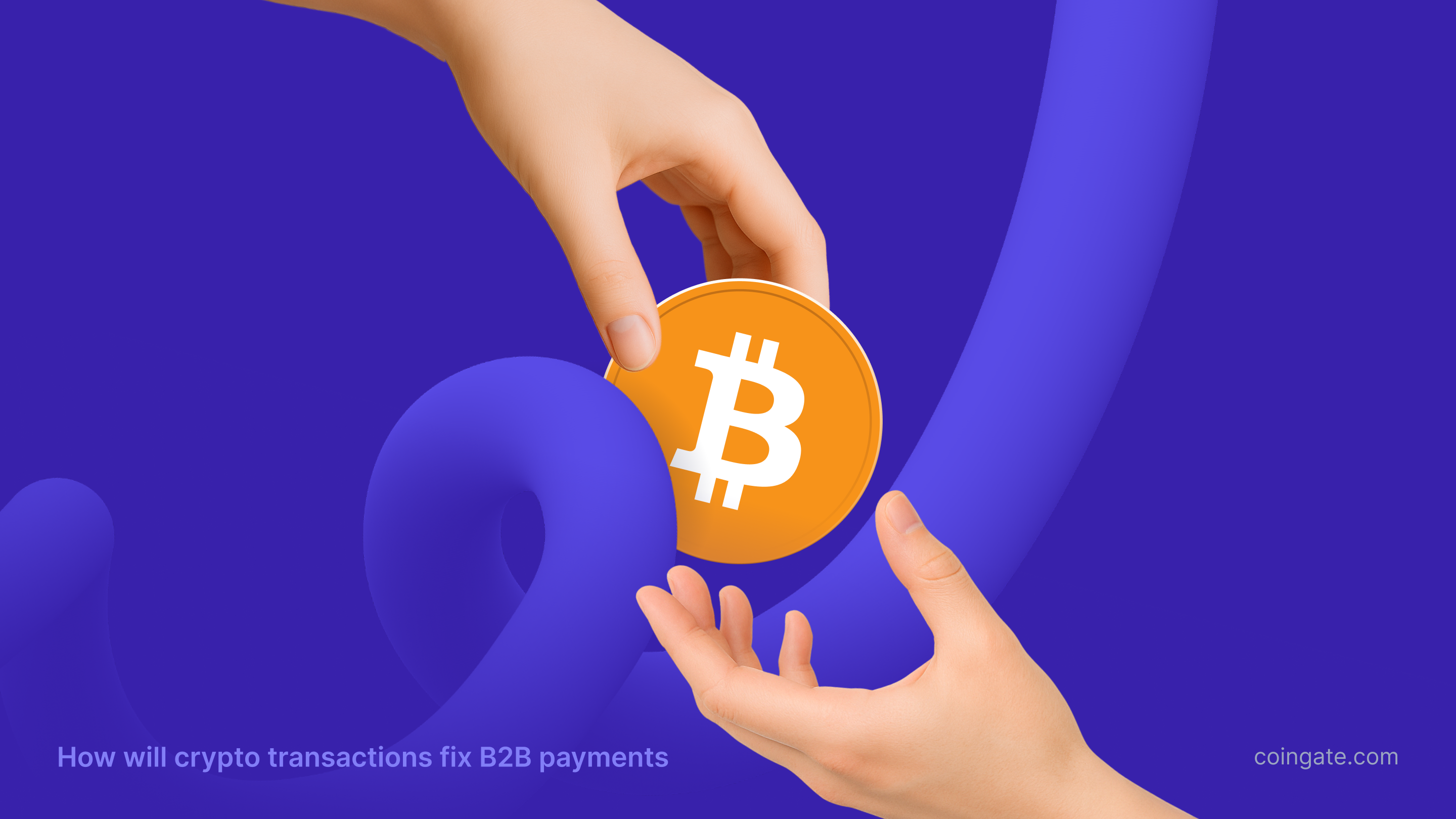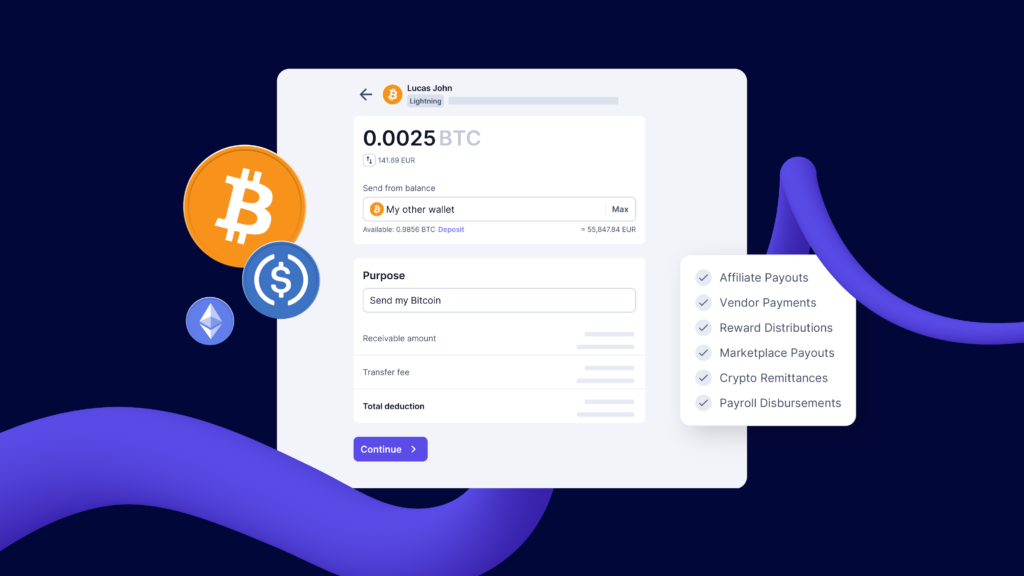
How Crypto Transactions Fix B2B Payments

Traditional B2B payments are outdated. They’re slow, expensive, and loaded with manual steps, especially for global transactions.
That’s where crypto comes in.
Crypto in B2B payments speeds things up, cuts costs, and removes middlemen. With blockchain technology, businesses can settle payments instantly, track every transaction in real-time, and operate with greater transparency and control.
As global trade grows more digital, B2B crypto payments offer a smarter, more scalable way forward. And the businesses that adapt now? They’re the ones that stay ahead.
Want to get started? Accept crypto payments with CoinGate – sign up to get started.
What are B2B Payments?
B2B payments are transactions made between two businesses in exchange for goods or services.
These payments are often large, come with strict approval workflows, and can take days or even weeks to clear — especially when dealing with banks, invoices, or international transfers.
As global operations expand, companies need faster, more secure ways to move money. Traditional systems are struggling to keep up, pushing businesses to explore modern alternatives like crypto B2B payments for speed and simplicity.
Types of B2B Payment Methods
Even in 2025, many businesses still rely on old-school methods to move money. While familiar, these systems often fall short in speed, cost-efficiency, and transparency — especially for global trade.
Let’s look at the most common B2B payment methods still in use today and why many are due for an upgrade.
1. Paper Checks
Yes, paper checks still exist in B2B. Some industries stick with them out of habit or legacy systems. But they’re slow, easy to lose, and expensive to process.
Checks take days to clear, require manual handling, and come with higher fraud risks. As more businesses go digital, paper checks are quickly falling behind as a reliable B2B payment method.
2. ACH Payments
ACH (Automated Clearing House) payments are widely used for domestic B2B transactions. They’re low-cost and easy to automate, making them popular in payroll and supplier payments.
However ACH payments rely on centralized banking networks, which means delays. They only process during banking hours, and settlements can take several days — a serious drawback for fast-moving businesses that need better B2B payment solutions.
3. Wire Transfers

Wire transfers are a go-to for high-value or urgent B2B payments, especially across borders. They’re faster than checks or ACH, but they come at a cost.
Fees can be steep — often $25 to $50 per transaction — and delays still happen due to bank verification steps and intermediaries. For international B2B, wires are too slow and expensive to scale efficiently.
4. Credit/Debit Cards
Credit and debit cards are sometimes used for B2B purchases, especially in retail, SaaS, or service industries. They’re convenient but not ideal for large or recurring B2B payments.
Processing fees can eat into margins — often 2% to 4% per transaction. There’s also a higher risk of fraud and chargebacks, making cards less reliable for high-volume or international business transactions.
5. Cash
While rare in the digital age, cash is still used for B2B payments in local or informal settings. But it’s impractical for large transactions or cross-border deals.
Cash lacks transparency, security, and proper records. It also increases the risk of theft and accounting errors — all major red flags for growing businesses.
The Limitations of Traditional B2B Payments
The old ways of moving money just don’t cut it anymore. Traditional B2B payment systems are slow, costly, and full of friction — especially when businesses operate across borders.
Here’s what’s holding them back:
- Slow settlement times: Transfers can take days, delaying critical operations.
- High fees: Between banks, card processors, and intermediaries, costs add up fast.
- Lack of transparency: Tracking where money is and when it clears is still unclear.
- Too many middlemen: Each step adds complexity, risk, and delays.
Modern businesses need faster, leaner solutions. That’s why more are exploring crypto and blockchain as efficient, secure alternatives.
Want to see how it compares? Check out the benefits of accepting crypto for your business or read more about how long a traditional wire transfer takes.
What is B2B in Crypto?
B2B in crypto refers to businesses using cryptocurrency to pay or get paid by other businesses. Instead of relying on banks or intermediaries, payments are handled directly over blockchain networks.
Smart contracts automate transactions, reduce errors, and speed up approvals. There’s no waiting on banking hours, crypto B2B payments can be settled in minutes, not days.
Companies can also streamline payments using tools like crypto payouts, making it easier to manage suppliers, contractors, or global partners.
Read the full guide to understand how it works.
Crypto: A Solution for B2B Needs
Crypto fixes many of the issues businesses face with traditional B2B payments. It’s faster, cheaper, and more transparent — no banks, no borders, no delays.

Industries like logistics and real estate are already seeing the benefits. Fast settlements improve cash flow, reduce downtime, and help companies stay competitive in global markets.
Built for Speed, Efficiency, and Programmability
Crypto transactions settle in seconds, not days. But more than speed, businesses can automate payments using smart contracts. That means invoices, subscriptions, and supplier payouts can all run on autopilot.
This kind of automation reduces human error, simplifies reconciliation, and integrates easily with existing ERP and accounting systems.
The benefits of blockchain for B2B payments are real: less admin work, fewer mistakes, and faster financial operations.
Check out our case studies that showcase the best success stories of companies adopting crypto for B2B and beyond.
Can B2B Companies Trade in Crypto?
Yes, they can — and many already do.
B2B companies can buy, sell, and settle deals using crypto while staying fully compliant. With tools like invoicing, currency converter, and withdrawals in fiat, crypto fits smoothly into existing financial workflows.
How Are B2B Crypto Payments Processed?
Unlike traditional methods, B2B cryptocurrency payments are fast, transparent, and irreversible.
Here’s how it works:
- A business sends an invoice or payment request.
- The buyer approves and sends crypto from their wallet.
- The transaction is verified on the blockchain, usually within minutes.
- Funds are confirmed and instantly available.
Every step is logged on a public ledger — no chargebacks, no middlemen. Businesses can easily manage invoices and send or collect payments using tools like crypto billing and payouts.
How Do You Transfer Money Using Blockchain?
Sending money with blockchain is simple, secure, and direct — perfect for modern crypto B2B payments.
Here’s what happens:
- The sender initiates a transfer from their crypto wallet.
- The transaction is validated by nodes on the network.
- Once confirmed, the funds are recorded on the blockchain ledger.
- The receiver gets the funds — often within seconds.
No banks. No waiting days. No uncertainty. With blockchain payments, businesses gain a tamper-proof and transparent payment process ideal for B2B deals.
What Are the Risks of Blockchain Payments?
Like any tech, blockchain has its risks — but most can be managed with the right tools and partners.
Here are the main concerns with B2B cryptocurrency payments:
- Regulatory uncertainty: Rules vary by country and are still evolving.
- Security risks: Wallets must be protected against hacks and phishing.
- Price volatility: Crypto values can fluctuate, unless using stablecoins.
- Scalability issues: Some blockchains struggle with network congestion.
- Lack of consumer protections: Transactions are final and irreversible.
Still, with trusted crypto payment solutions, most of these risks are minimized — allowing businesses to benefit from fast, global, secure payments.
Types of Online Blockchain Payments
Businesses today have multiple options when it comes to accepting or sending payments on the blockchain. Each method suits different needs, from direct transfers to fully automated systems using stablecoin payments.
Here’s a breakdown of the most common B2B payments blockchain solutions in use today.
1. Cryptocurrency Transfers
This is the most direct method of B2B crypto payments. One business sends crypto from its digital wallet to another — no banks, no delays.
These transfers are fast, borderless, and ideal for international deals or suppliers in different countries. It’s especially useful for companies looking to skip currency conversions and transaction delays.
2. Payment Gateways
Some businesses want the benefits of crypto, but still prefer to receive local currency. That’s where payment gateways come in.
Using a crypto gateway, payments are converted from crypto to fiat in real time. This offers the speed and flexibility of crypto, with the stability of traditional currency.
Solutions like CoinGate’s payment gateway for marketplaces make this setup easy for B2B platforms and service providers.
3. Smart Contracts
Smart contracts are self-executing agreements stored on the blockchain. For blockchain for B2B payments, they eliminate manual steps and human error.
Once conditions are met — like delivery confirmed or milestones reached — the payment happens automatically. No follow-ups, no delays.
4. DeFi Platforms
Decentralized finance platforms open new doors for B2B crypto payments. Businesses can borrow, lend, or hold funds — all without traditional banks.
DeFi tools offer built-in escrow-like services, suitable for milestone-based contracts or large purchases. No middlemen, no waiting on approvals.
Is Blockchain Right for You?
Not every business needs crypto, but for many, it’s a perfect fit.
If your company values fast settlements, lower fees, transparency, and global reach, B2B blockchain payments could be a game changer. It’s especially valuable for industries with complex supply chains, global vendors, or time-sensitive contracts.
Before switching, evaluate your operational needs, client readiness, and compliance requirements. If it checks out, start exploring solutions like a crypto payment gateway for businesses to get moving.
How to Integrate Crypto B2B Payments?
Getting started with B2B crypto doesn’t have to be complicated.
Here’s a simple roadmap:
- Choose a payment processor like CoinGate that supports B2B transactions.
- Set up a wallet to send, receive, or convert crypto securely.
- Integrate payments into your website, ERP, or invoicing tools.
- Ensure compliance with local regulations and reporting standards.
- Educate clients and partners so they understand how to pay you in crypto.
Why Crypto is Here to Stay
Major brands are already using crypto — and not just for hype.
From global retailers to SaaS companies, businesses are adopting crypto B2B payments to move faster, cut costs, and future-proof their operations. With billions already transacting in crypto, the momentum is real.
It also helps businesses tap into a growing customer base. Want to get more crypto-savvy clients? Here’s how to attract crypto shoppers to your business.
Ready to Transform Your B2B Payments with Crypto?
If your business is ready for faster, cheaper, and smarter payments, now’s the time to switch.
With CoinGate, you can easily start accepting and sending B2B crypto payments, automate payouts, and streamline your entire payment workflow. Whether you’re paying suppliers, contractors, or international partners — crypto makes it easier.
Explore CoinGate’s tools or sign up today to get started. The future of B2B crypto payments is already here — and it’s built for efficiency.
Crypto B2B Payment FAQs
Why are traditional B2B payments so slow?
Traditional B2B payments rely on banks, intermediaries, and manual processes. Each step adds delays — especially with cross-border transactions. In contrast, blockchain B2B payments settle in minutes without the need for multiple third parties.
How do stablecoins improve B2B payments?
Stablecoins reduce volatility in cryptocurrency B2B payments by keeping their value tied to fiat currencies. They’re ideal for businesses that want fast settlement without worrying about price swings — all while benefiting from blockchain.
What are the benefits of crypto technologies within B2B payments?
Crypto offers faster transactions, lower fees, better transparency, and automated workflows. It eliminates paperwork and gives full visibility into each transaction, making crypto solutions for B2B payments smarter and more efficient.
Accept crypto with CoinGate
Accept crypto with confidence using everything you need in one platform.

